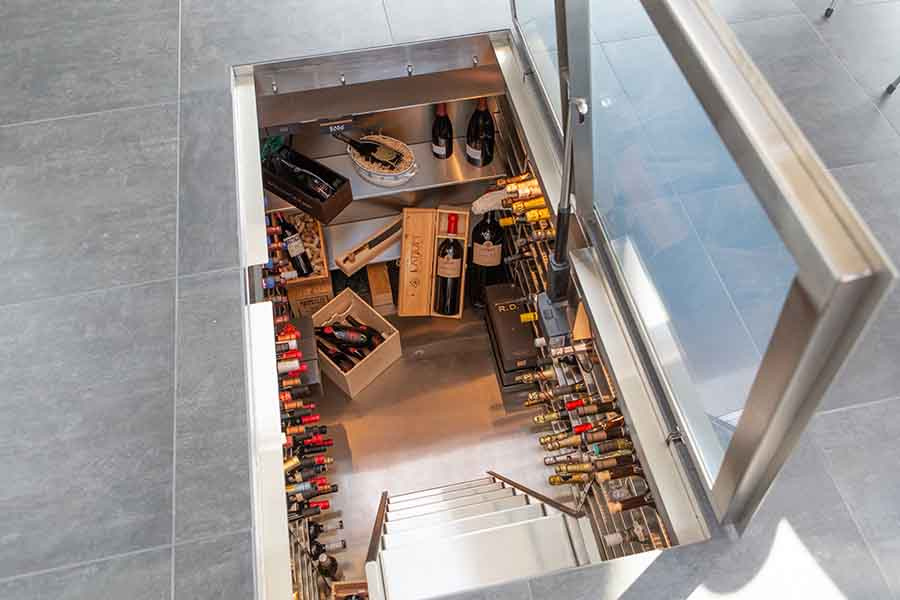
Wine Cellar in Basement
Have an unused basement area? Then you already have the perfect starting point for a wine cellar. With a stable temperature and naturally dark environment, your wines get ideal storage conditions – while you make elegant and practical use of available space.
What Is a Wine Cellar and Why Should You Consider Having One?
A wine cellar lets you store wine under ideal conditions – preserving quality, taste, and value. A floor-embedded wine cellar is a space-saving, elegant solution that integrates seamlessly into your home.
Whether you’re building your own, converting a basement, or choosing a custom design, it’s important to ensure the right temperature, humidity, and layout. Choose between modular cellars or tailor-made solutions to match your needs and space.
A wine cellar not only protects your bottles – it becomes a stylish and functional part of your home.

Step-by-Step Guide: How to Install a Basement Wine Cellar
Installing a basement wine cellar gives you a practical and elegant way to store wine at home. Choose between a ready-made Vinorage wine cellar or a custom-built room with a motorized glass hatch. Here’s a simple overview of both options.
Option 1: Ready-Made Vinorage Wine Cellar
- Prep: Ensure your basement is dry and measure the space.
- Install: Follow the included guide for easy setup.
- Access: Add a Vinorage floor hatch for a sleek finish.
Option 2: Build Your Own Wine Cellar Room
- Plan: Inspect and measure the area carefully.
- Materials: Use moisture-resistant options like concrete or treated wood.
- Climate: Ensure proper ventilation and stable humidity/temperature.
- Finish: Choose a motorized glass door for a modern look.
Want more ideas for a custom wine cellar? Check out our full guide for inspiration. Whichever solution you choose, you’ll enjoy smart, stylish storage tailored to your needs.
Advantages and Disadvantages of a Wine Cellar in the Basement
A wine cellar in the basement is a practical and stylish solution for home wine storage. It utilizes unused space and offers several benefits, but there are also some drawbacks to consider before starting the project.
Advantages of a Wine Cellar in the Basement
- Space-saving: Makes use of the space under the house, providing discreet wine storage, ideal for small homes.
- Optimal temperature: The basement offers stable climate conditions, perfect for preserving wine.
- Protection from light: Keeps wine shielded from harmful UV rays and light.
- Aesthetic solution: Creates a luxurious and sleek room for wine storage.
- Discreet and elegant: A wine cellar that doesn't take up much space and can be equipped with a motorized wine cellar floor hatch.
Disadvantages of a Wine Cellar in the Basement
- Requires adjustments: Installation can be time-consuming and may incur additional costs.
- Humidity: Basements can have high humidity, requiring good ventilation to protect the wine.
- Limited space: The basement may be small with low ceilings, requiring alternative solutions in some cases.
A wine cellar in the basement offers many benefits, especially in terms of space-saving and protecting your wine. With the right adjustments, it can be a practical and stylish solution.

Wine Cellar in the Basement: A Summary
A wine cellar in the basement is a smart solution if you have the space, offering stable temperatures and protection from light. Just remember to consider ceiling height, ventilation, humidity, and the floor’s load-bearing capacity. You can choose a ready-made solution like Vinorage or build your own.
The main benefits are a stable climate and efficient use of space. Downsides may include installation costs and the need to monitor humidity and temperature. If this isn’t the right fit, a wine fridge or other storage options could work better.
Still unsure? Contact our customer service – we’re happy to help.
